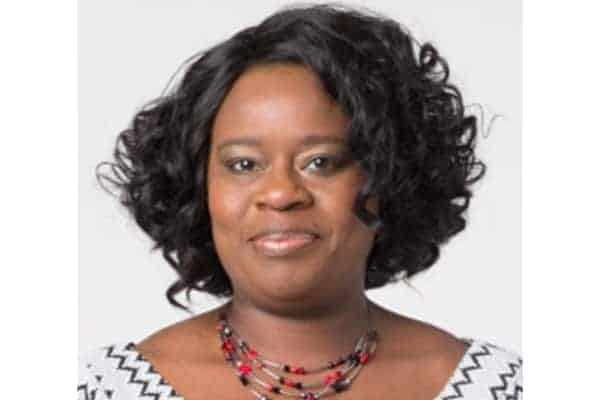
Life as a self-employed Project Manager with APM board member Yetunde Adeshile
Posted on 20th July 2021 by Katherine Ducie
As part of our Meet the Freelancer series of blogs, we interview many freelance professionals from a range of industries.
This month, we meet London based Project Manager, Yetunde Adeshile.
Yetunde began her career as a self-employed Project Manager in 2012 and has since contracted across the private, public, and not-for-profit sectors, managing a variety of high-profile projects from start to finish.
As well as working as a Project Management contractor, Yetunde is a board member of Association for Project Management (APM) the chartered body for the project profession, a not-for-profit organisation trustee and director, career coach, politician and author.
In this interview, Yetunde shares with us:
- how her career as a Project Manager began
- why she decided to go freelance
- what she loves most about her career as a Project Manager
- the challenges she has faced as a Project Manager
- how she manages a busy schedule
- advice for new Project Managers.
How did your career in Project Management begin?
“I’m a graduate of Social Policy and Management, who specialised in Human Resources Management. At the time I graduated, as is today, jobs were very competitive for new graduates, especially those without appropriate work experience. This intense competition, lead me to do temping work while I waited for permanent work to come up.”
“I worked as a Project Administrator for the Jubilee (tube) Line extension and as I worked with engineers, I got interested in what they did, particularly in the project planning discipline. I started my training and development in project management, at the time that I was a permanent member of staff, with Transport for London.”
“I then started to develop myself further with internal training to become a Project Manager and began looking at the specialist skills of planning and cost engineering. I liked planning and costing aspects of project management, so I was fortunate to get a position internally as a Planning and Costing Manager and my career just went from there.”
“I went into Project Controls and from there I ended up working with McDonalds where I got the opportunity to deliver projects as a Project Manager and as a Program Manager, so it gave me the rounded skills that I needed at the time when a lot of organisations were making redundancy cutbacks.”
Why did you decide to go freelance?
“At the time that I made the decision to go freelance, it was the best option for me and I’ve been contracting ever since.”
“I just didn’t feel that being permanent was for me because I wanted to be able to get experience in different organisations, on different types of projects and the only way I was going to get that opportunity, or be in charge of where I work and what I do, was to freelance.”
“The flexibility you get and the opportunity to be in charge of your own destiny is part of the reason I went into contracting in the first place. You decide on the organisations you work for and its terms and conditions suitable to yourself.”
“There were certain companies that I wanted to work for, and I think I have now worked with all of them through contracting.”
What type of projects do you usually work on?
“The industry I’ve worked in for the longest time is rail and transport, but I have done business development expansions, business transformation and IT related projects as well. I’ve done business change, organisation startups, IT, aviation, water and more. I’ve had a very broad experience which I am personally grateful for.”
What do you love most about being a Project Manager?
“Project Management is just one of those professions where nothing is set in stone. You can have your plan and you can have your budget, but things change.”
“It’s all about managing change and I think that’s what I like in Project Management and that’s what actually attracted me to the profession in the first place. It’s managing change in a controlled manner, so if you’ve got everything under control, you can make quick decisions. You can make the right decision. It’s a dynamic profession.”
“It’s the challenge that nothing is certain in what you’re doing, no matter how well you plan it, something is bound to change and you can imagine how much change has happened and had to be managed over the last year with Covid-19. It’s that kind of environment that keeps me going.”
“It also involves teamwork which is another thing that attracted me to the profession.”
How do you manage to juggle so many professional commitments and hobbies?
“Some people might think there’s not enough time to fit in everything I’m involved in, but actually there is. It’s all about time management. Maybe I get away with it because I’m a Project Manager!”
“I am busy but I’m not busy day in day out. I am involved in a lot of things but I don’t do it all at the same time – that’s how I do it.”
“I’m not writing a book at the same time as there is an election going on. After the election, when things have calmed down and I get my weekends back to myself, I might want to write a book then.”
“I plan it out. It’s a project so it might be two hours here and two hours there. I don’t spend days and weeks on writing as you might imagine your typical author would.”
“Six years ago, I wrote my first book with the aim of helping people to understand young people better as opposed to wanting to make money or to get famous. I did it more for leisure.”
“As a politician as well, you’re not constantly being political. There are times that we hold our meetings. These times don’t clash with the day job and aren’t running at the weekends and so this gives me time for other things then.”
“I think that if you have good time management, and can manage yourself according to that time, all things are achievable.”
What challenges have you faced as a Project Manager?
“Decision making in organisations can be slow. I’ve worked on projects that were going fine and then you come to an obstacle, and they decide to stop the project because it no longer seems viable so you can be on a project not knowing whether the project will complete and that’s a challenge in itself.”
“Sometimes it’s a challenge getting the right resources to support your project and team members and on other occasions teamwork itself can be challenging.”
“Sometimes there are stages of projects where you have to go to a public consultation, and you have to think about how you will appease the residents. There’s a lot of stakeholder management.”
“There’s all sorts of things going on and that’s actually what makes project management very beneficial.”
How did you get into politics?
“I got into politics at the time the UK voted for Brexit. I was interested in politics beforehand, but I wasn’t interested in it enough to become a politician, but Brexit was the game changer for me. I realised that whatever happened then was going to affect our future and I wanted to be closer to the decision making of Brexit.”
“I think it was the most challenging period that I’ve ever seen or experienced in politics. I decided to take my interest further and in the process of just being a member I ended up being a politician.”
“It’s more about making change locally and if I can be a part of that, it’ll just be amazing.”
“Managing change is my passion. Seeing change and the outcome of good change and its end result is an amazing feeling.”
What piece of advice would you give to any new Project Managers starting out?
“I think the best advice I can give is, if you’re already working on a project, stick with your project, make the most of it and be creative in your decision making.”
“The beauty of project management is that there isn’t one right way to do it, apart from meeting government guidelines and legislation. It really actually relies on your creativity so in that I would encourage any Project Manager to be creative and build a career around your qualifications.”
“Get qualifications and get trained. I think being a part of Association for Project Management (APM) actually inspires you to keep reaching for higher aspirations, no matter what experience you’re getting on your project.”
“As an APM member, you get access to member exclusive content and Project journal which includes features about other people’s projects and the challenges and experiences they’re having. There are many inspirational stories that you can learn from, to inform your better decision making.”
“If being a Project Manager is too much for you – because as a Project Manager, you’re managing all the streams of everything in that project, you could choose the option to specialise in one area.”
“You could specialise in commercial, planning or project reporting, instead of doing everything and then of course there are senior roles like Project Sponsors or stakeholder engagement.”
“You’re still part of the project team, you’re just not taking the lead but then even as a planner you can take the lead because most organisations now have a department for planning and in that department, will have a manager that will be managing all the planners in the team.”
“Don’t think that your career will not grow beyond a certain level because you’ve gone into a specialist area, just do what is best for you and try to work your way up the ladder in that way.”
“Project Management has scope for diversity, it’s got scope for movement, you don’t have to be stagnant. You don’t have to do just one thing.”
Career focused goals for the future
“I think in my career, I’ve worked for every organisation I wanted to work for and I’ve delivered projects that I’ve always wanted to deliver.”
“I now want to go into training the next generation of Project Managers and adding value to organisations, using the wealth of experience, I have obtained over the years. I also want to expand my leadership coaching expertise, to support individuals and businesses to develop their leadership capabilities.”
“That’s the privilege that contracting has afforded me because the training that I’ve done over the years has been down to me whereas if I had been working for an organisation, there’s certain training they won’t pay for. As a contractor, you’re looking after yourself, your personal development (without restrictions) and what you can offer to your clients, that makes you stand out from the competition.”
You can find out more about Yetunde and Association for Project Management (APM) at www.apm.org.uk
Click here for more information about how you can stay protected with Project Management Insurance, or click the button below for a quick online quotation.
CLICK HERE FOR A QUICK ONLINE PROJECT MANAGEMENT INSURANCE QUOTE
Related articles:
Running an international Management Consultancy service with Mervyn Stanley
What are the pros and cons of working as a self-employed contractor?
Key points to consider if you’re thinking of hiring your first employee
Read more of our Meet the Freelancer series here.



